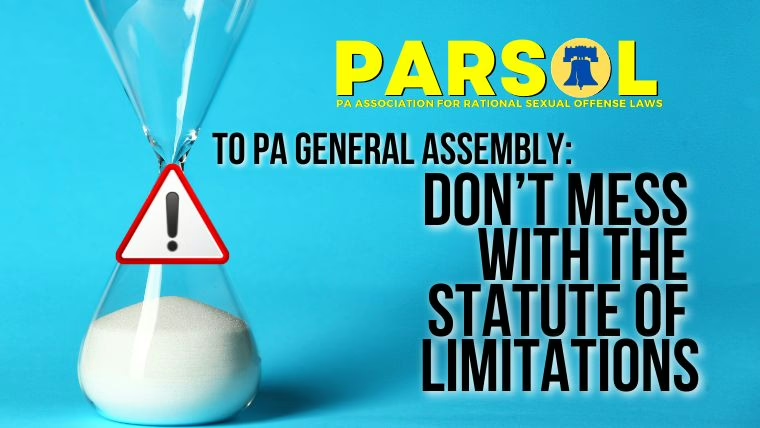It may be impossible to tally the true costs of PA’s sex offender registry.
Please see our letter to the Legislature about the monetary and personpower costs associated with compliance with federal standards for sex offender notification and registration.
The letter is formatted for the general public to utilize. If you have concerns about the public sex offender registry, we encourage you to either download and attach the document to an e-mail or print it out and send a physical copy to your state Senator and Representative. Use our “Find your Legislator” link under the resources tab.
Here is the text version:
[Date}
Re: Costs to the Commonwealth associated with public sexual offense registries
Esteemed Members of the General Assembly, I hope that this letter finds you well.
In 2019, the Supreme Court of PA heard several cases which challenged portions of PA’s Sex Offender Registration and Notification Act (SORNA), enacted as Act 29 of 2018. The court is expected to rule on the constitutionality of Act 29 later this year.
As you may know, the PA Association for Rational Sexual Offense Laws (PARSOL) advocates for policy that is best supported by available research. These studies come from experts in Criminal Justice and Mental Health and inform us on our goal of protecting people from sexual harm and exploitation.
Towards that end, the research is very clear: public sex offense registries show no significant effect of reducing the amount of sexual offending in our Commonwealth. Combined with the real possibility that the public registration aspect of Act 29 will be deemed unconstitutional, we believe that the time has come to consider alternatives.
The prevalence and seriousness of sexual offending underline the need to identify it as a public health issue. Policy that truly aims to prevent sexual offenses must focus on proactive measures like education and rely less on long periods of public registration.
While we have become accustomed to and perhaps comfortable with the idea of a public sex offense registry, it is a false comfort. Rates of recidivism are low, there is no risk assessment in our offense-based system of classification, and perpetrators of sexual offenses are largely already associates of the victim.
The costs of maintaining the public sex offender registry in PA are significant. State Troopers and probation officers on the ground entering information by hand, IT professionals, legislative researchers, legal counsel defending frequent litigation, compliance checks, and the great time and effort required to update SORNA with the latest legislative fix all contribute to huge costs in dollars for the PA taxpayer and in man-hours for our State Police. All of this coordination for a registry which shows no effectiveness at accomplishing what it was designed to do.
Our focus on downstream strategies means that we ignore the chances to promote primary prevention strategies as outlined by experts from the Johns Hopkins Moore Center for the Prevention of Child Sexual Abuse. The General Assembly should divert resources from the maintenance of SORNA to the promotion of evidence-based prevention initiatives.
It has been suggested that the loss of federal funding that might accompany deviating from our current approach would prevent reform from gaining support. A 10% loss of Justice Assistance Grant (JAG) funds (approx. $626,000) could result if the Sex Offender Management, Apprehension, Reporting, and Tracking (SMART) office determines that PA has not substantially implemented federal SORNA standards.
This concern over loss of funding is over-inflated. The text in the federal SORNA legislation provides a waiver for states who are preempted from full compliance due to conflicts with their state Constitution. This waiver was applied for and granted by the SMART office for the FY2019. In the case that the SMART office does not grant a waiver as a result of PA’s transition to more effective public safety measures, the savings and harm reduction mentioned above would far outweigh a loss of $626,000.
I appreciate the time you have taken to review this letter and consider the issues I have raised. This is not a popular topic to take up among Members. However, the day-to-day consequences are real for the citizens of PA: lawmakers are failing to do their best to address the public health crisis of sexual offending, and we are limiting the dignity and liberty of over 20,000 people and their families by prolonging the use of ineffective public sex offense registries.
I look forward to meeting with you soon to hear your perspective and explore the unique challenges that this situation presents.
Sincerely,
![stuckIn1995_rally_header - PARSOL - Pennsylvania Assoc for Rational Sex Offense Laws (PA Megan's Law Resources) PARSOL Board Chair Josiah Krammes speaks at the PA Capitol Rotunda flanked by State Reps. Emily Kinkead and Tim Briggs (28 Oct 2025) [John Dawe/PARSOL]](https://parsol.org/wp-content/uploads/2025/10/stuckIn1995_rally_header.avif)



The hidden costs of compelling human subservience by law are indeed exponentially expanding. The sex offender regime cracked open the door to the threats we see developing in Congress against big tech antitrust concerns. If a state can insist on plain indenture of human to electronic property maintenance as merely ” civil & collateral ” the a more powerful federal may have no limit at all with respect to either individual sovereignty nor individual liberty.
Resistance is futile you MUST comply with the insatiable need for data to feed the machines.